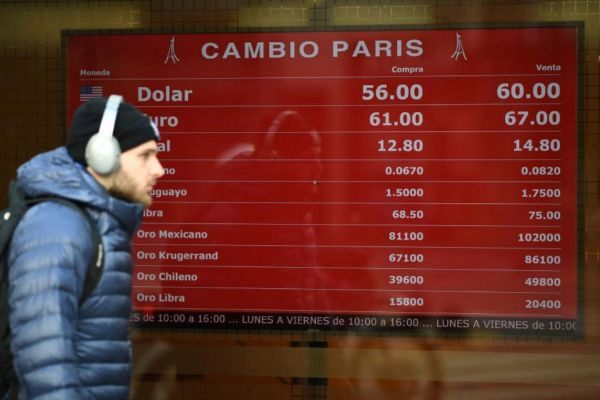Argentina woke up on Tuesday resigned to see that the financial crisis started on Monday deepens: the peso continued to lose value against the dollar, the "country risk" doubles that of Monday and the government of Mauricio Macri gave no sign of measures to curb a situation that begins to have an impact on the real economy, on commodity prices.
The devaluation of the peso, in just one hour, was 7.5%, but the data that most impacted at the beginning of the day of financial markets on Tuesday was that of the "country risk", which reached its highest level in ten years. What is the "country risk"? It is the excess interest rate paid by the Argentine debt in international markets, a reflection of the distrust in the country: the higher, the less hope there is that Argentina will fulfill its obligations to its financiers.
The crisis broke out after the triumph of the Peronist Alberto Fernández in Sunday's primary elections. Fernandez won by 47% to 32 on Macri. The general elections are October 27, but all analysts agree that the economy of the country will not resist if it follows the path of the last two days.
If a dollar cost 47.55 pesos the Friday before the elections, today it was already quoted at 60. The variation of the US currency has a direct impact on prices: when it is very accelerated, as in this case, it generates chaos and leaves reference values to businesses, but the almost immediate consequence is the acceleration of inflation, which today stands at 50% annually.
In parallel to the financial shocks, Fernández starred in a major with the president of Brazil, Jair Bolsonaro, who yesterday warned that if Kirchnerism wins in October there will be an exodus of Argentines to his country. At night, the one who is emerging as the next Argentine president raised the stakes: "I celebrate Bolsonaro speaking badly about me. He is a misogynist, a racist. I only ask him to leave Lula (da Silva, former president) in freedom. With Bolsonaro I have no problem in having problems. "
The tension between Brasilia and Buenos Aires opens doubts about the future of Mercosur, as well as the long-term viability of the agreement between that commercial bloc and the European Union (EU) signed by Macri in June. Brazilian media said that members of the government are trying to moderate their president.
According to the criteria of The Trust Project
Know more- Argentina
- European Union
- Mercosur
- Mauricio Macri
- Jair Bolsonaro
- David Silva
- Brazil
- Latin America
- Argentina Elections
BRAZIL Bolsonaro places his son as ambassador to the US
PolicyThe PSOE calls for preventive safeguard for citrus in the Mercosur pact
ArgentinaFinancial crash and devaluation of the peso in Argentina after the victory of Alberto Fernández

